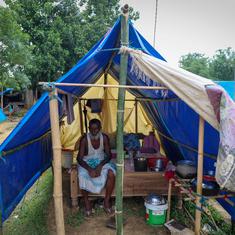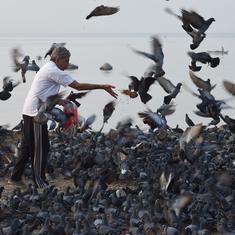Seventy-five-year-old Anasuya Patel and her husband VP Patel, 77, can barely walk without support.
But on Wednesday morning, the couple joined an angry crowd as it marched towards the iconic kabutarkhana in Mumbai’s Dadar and tore off the tarpaulin sheet in which it was covered.
The kabutarkhana, or pigeon-feeding spot, had been covered with the sheet and wooden scaffolding on Sunday on the orders of the Bombay High Court.
Hundreds of pigeons immediately flocked to the spot to peck at the grains hurled by the crowd.
The court had directed the Brihanmumbai Municipal Corporation to seal 51 pigeon-feeding spots in the city on the grounds that their droppings and feathers posed a public health hazard.
But Patel was aghast. “If your children are dying of hunger, can you eat?” she asked.
The couple had taken a taxi from their home in Mumbai’s Matunga to defy the court order.
Two floors above Patel’s flat in Jamnadas Mansion, however, Bhogilal Manilal Parmar is tired of shooing away pigeons.
Outside his home is the decades-old Matunga kabutarkhana. From his window, he can see pigeons swarm over almost every inch of the tree outside.
Parmar has breathing problems, as do his three daughters. One of them recently contracted pneumonia.
A doctor had told him that their respiratory problems were due to the pigeon droppings all around their home, Parmar said.
“We moved into this building six years ago,” Parmar said. “Our breathing problems began after that.”
He has been planning to move out of the flat, but the court order has given him pause. “We are hopeful that the kabutarkhana will remain shut and we won’t have to move,” he told Scroll.
Parmar said he has tried to reason with his neighbours. “But they think I am cruel,” he said.
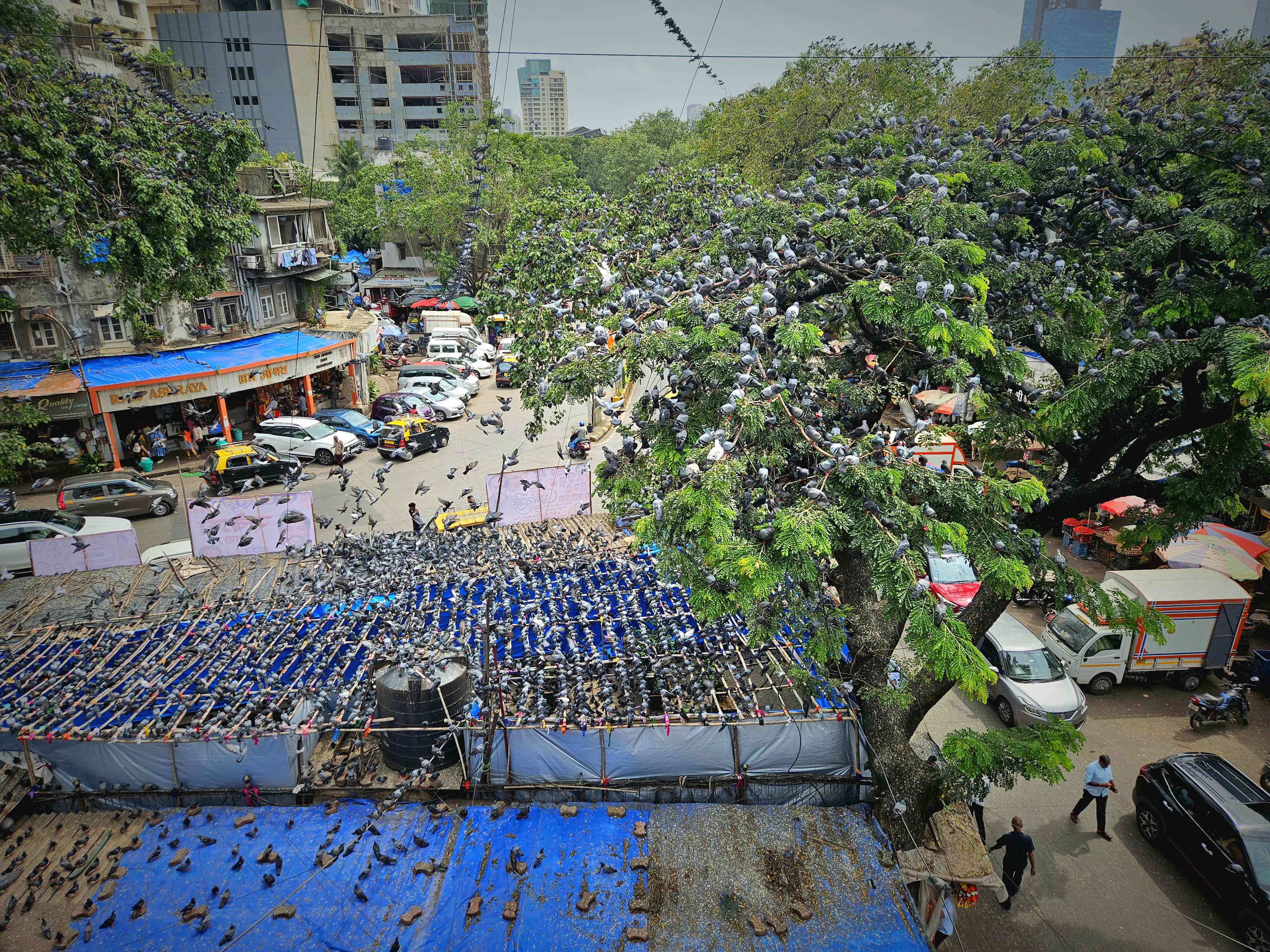
As with Patel and Parmar, the ban on feeding pigeons in public has sharply divided the residents of Mumbai neighbourhoods.
The Jain community has taken the lead in mobilising protestors to defy court orders and push for the reopening of all kabutarkhanas.
With the civic polls approaching, Maharashtra Chief Minister Devendra Fadnavis has tried to placate the community by directing the municipality to permit controlled feeding.
The health risk
As Scroll has reported, the pigeon population in India has increased enormously, as the bird has adapted extremely well to urban, concrete environments.
The 2023 State of India’s Birds report found that between 2000 and 2023, the population of pigeons in India increased by more than 150%.
With easy access to grain and ample space in buildings to lay eggs, their population has multiplied rapidly, posing a health hazard.
The Bombay High Court cited a report by the pulmonology department of KEM Hospital, which warned that exposure to pigeons could lead to “acute interstitial pneumonitis”, a debilitating condition.
The report said that pigeon droppings and feathers have pathogens that trigger asthma, affect lung function and lead to lung diseases like hypersensitivity pneumonitis.
Alpa Mehta found that out the hard way.
The 54-year-old lived on the second floor of Anasuya Patel’s building in Matunga till about five years ago. Like many others, she too fed pigeons regularly.
“Around that time, my mother was diagnosed with hyper-fibrosis of the lungs,” Jayna Mehta, her daughter said. “The pulmonologist advised us to move out immediately.”
Jayna recalls speaking to the building residents, several of them Jains, about the health risks posed by pigeons. “They thought we were making it up,” Alpa Mehta said.
Only 47% of her mother’s lungs are in a working state, Jayna Mehta said. There is an oxygen cylinder always at home and she will be dependent on steroids for the rest of her life.
Jayna Mehta has little sympathy for those inciting others to defy court orders.
“We are Jains too,” she said. “But we are shocked that our community would go and tear open a kabutarkhana. Only those who suffer can fully understand the risk.”
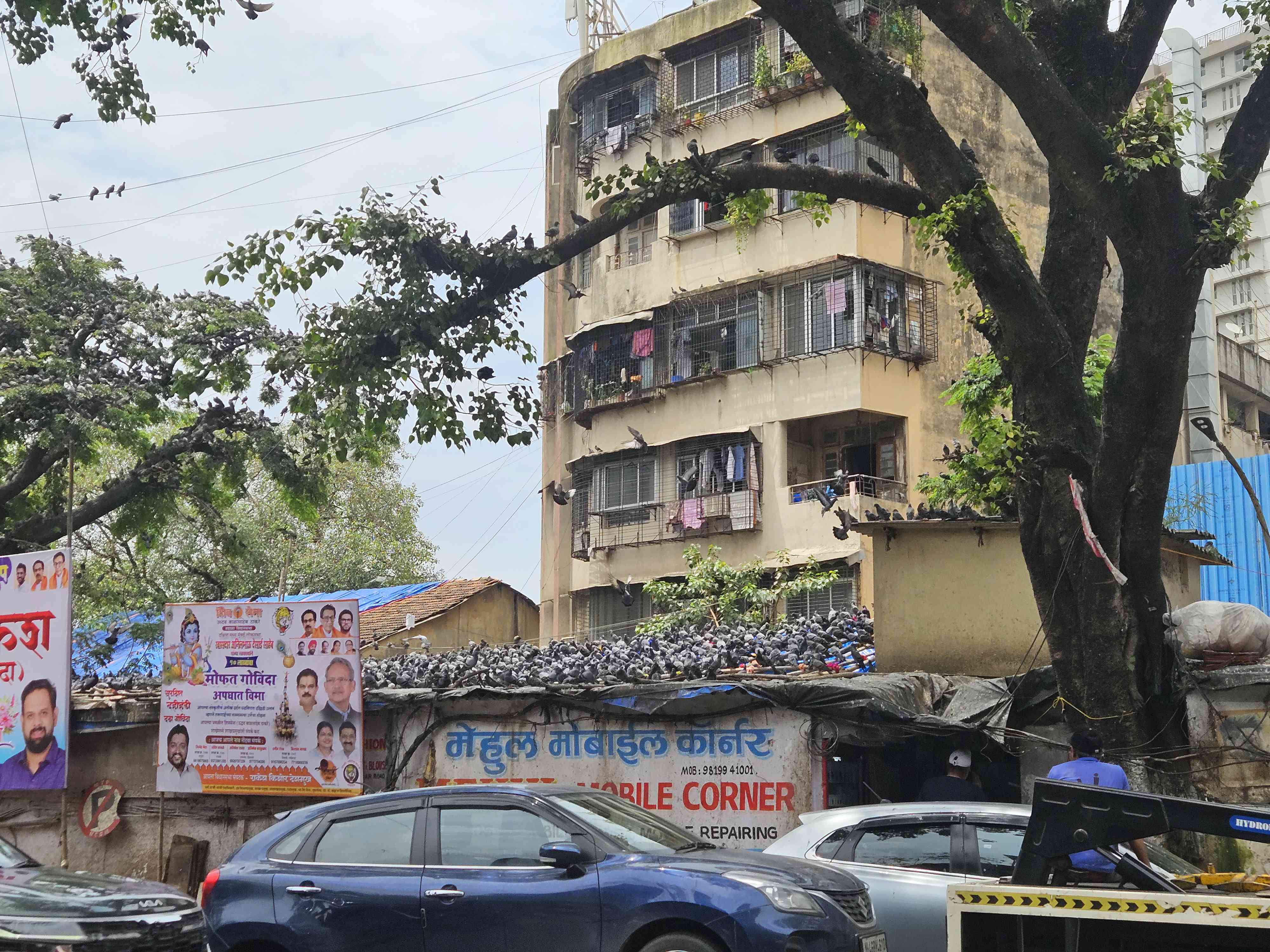
‘Act of service’
Her former neighbours remain unconvinced.
Jayshree Shah, who lives on the first floor of Jamnadas Mansion, refuses to believe that pigeons can cause any health risk.
She said none of the residents who have complained about the birds could show her any proof.
“My grandmother taught me to feed pigeons when I was a child,” she said. “We have been doing so for generations. For Jains, feeding pigeons is an act of service.”
When the municipal corporation shut the feeding spots, Shah began a campaign on WhatsApp, urging people to come out and protest.
“It hurts us to see the birds die of hunger,” she said.
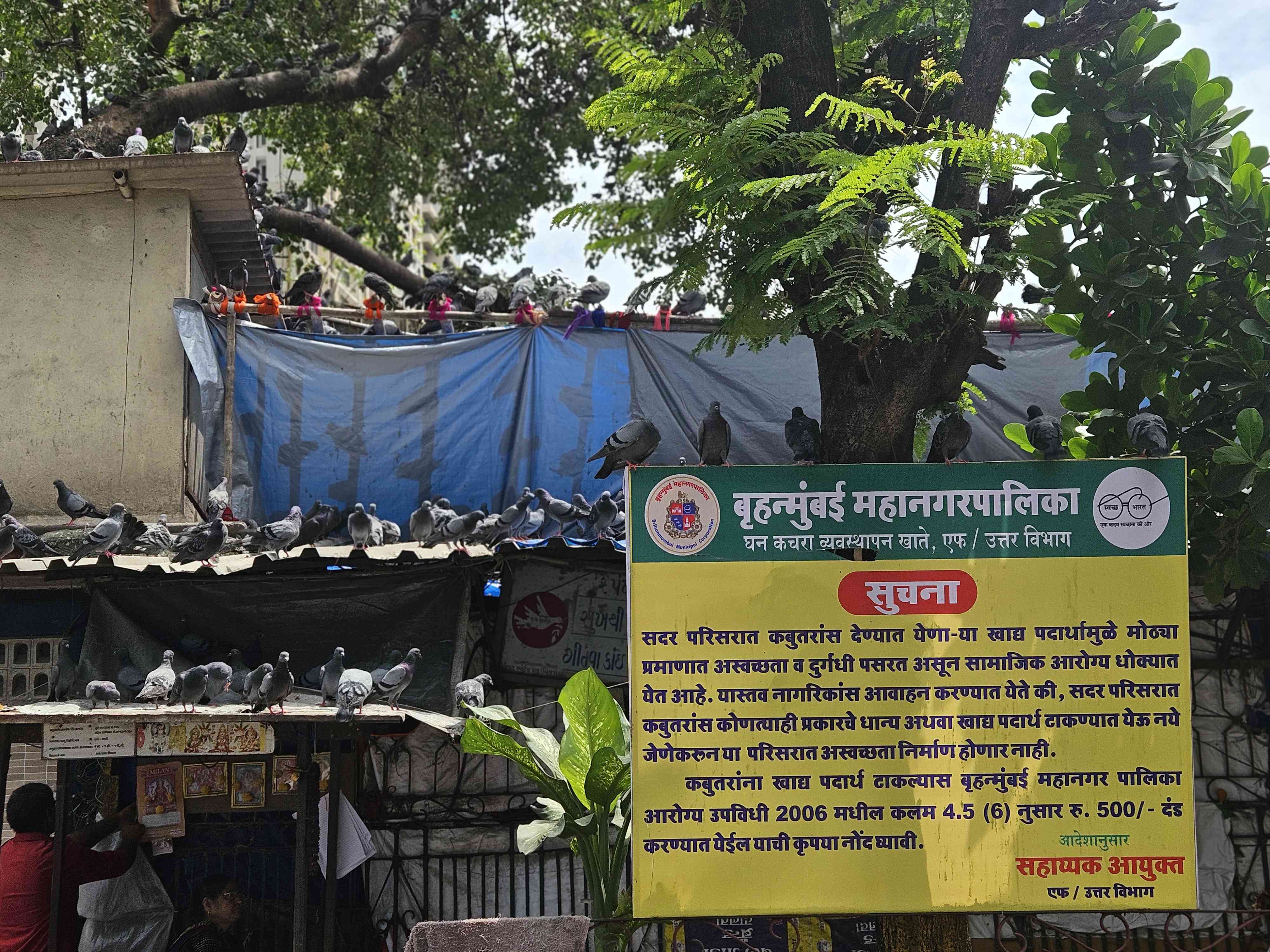
Several pigeon lovers told Scroll they continue to feed the birds secretly.
“We check if there is a civic official around. If he is not, we throw some grains near that tree,” said shopkeeper Dhanwant Mehta, pointing to an area close to the Matunga kabutarkhana.
The city municipal corporation has fined nearly 150 people for flouting the ban.
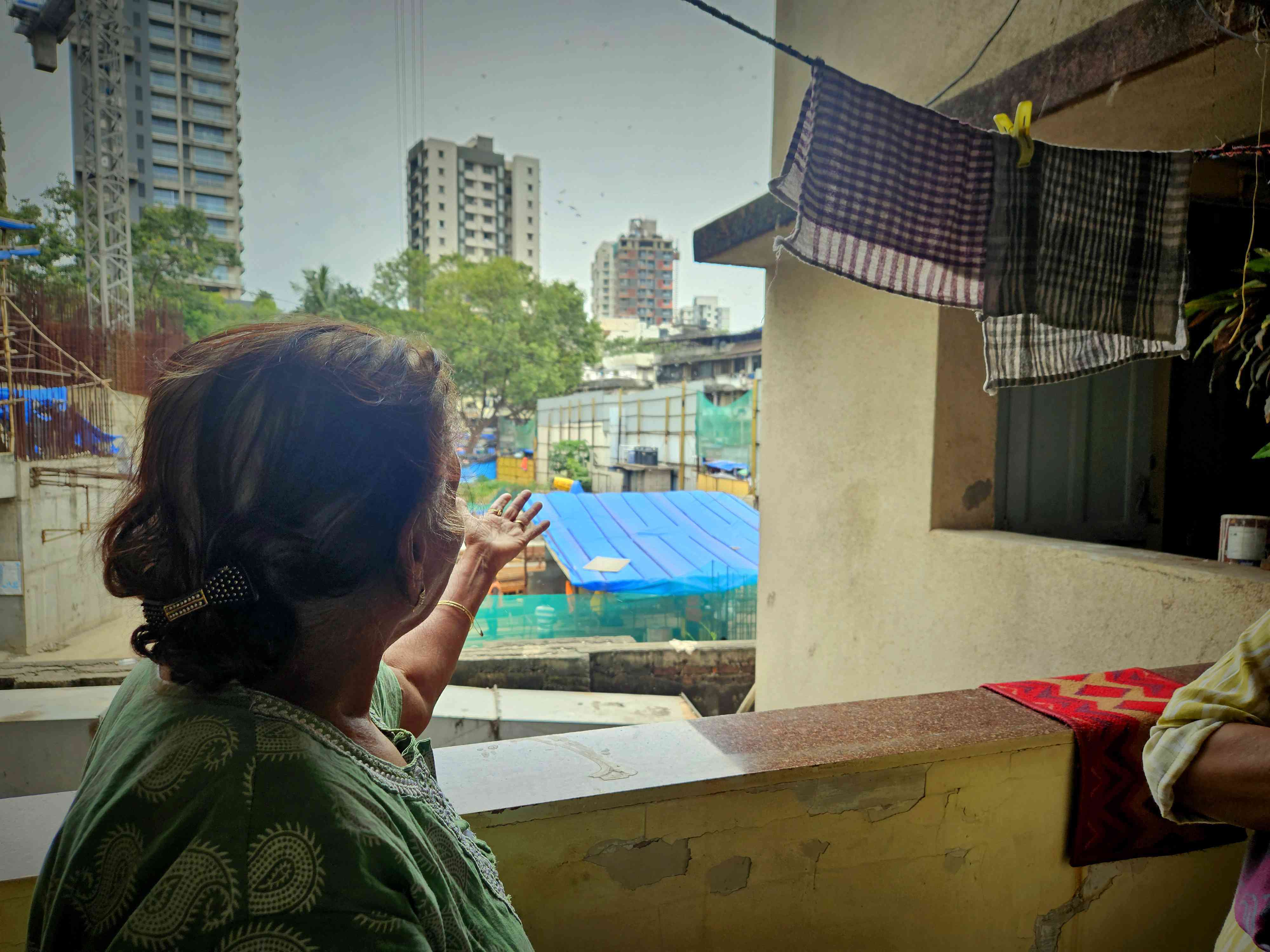
‘Not animal haters’
Sometimes, the conflict between the pro- and anti- bird feeding camps has tipped over into violence.
On August 3, Premal Patel, a senior executive in a multinational company, registered a first information report against some members of his apartment complex on Mira Road.
He alleged that they had assaulted him with iron rods when he objected to them feeding the birds.
In the last nine months, the number of people feeding pigeons in the complex has grown.
“So, more and more pigeons now fly into our society,” Premal Patel said.
Their presence made him worried about his 70-year-old father’s health. “I am worried this will affect his lungs. He already has breathing problems.”
On August 3, his father clicked photographs of a local resident who was feeding pigeons in violation of the court order. That led to a heated argument and the alleged assault.
“We are not animal haters,” Premal said. “But there is a thin line between loving animals and encouraging an uncontrolled population that can harm humans.”



